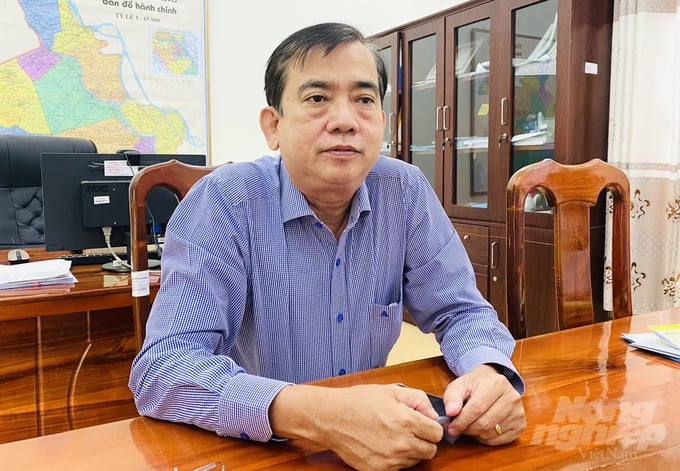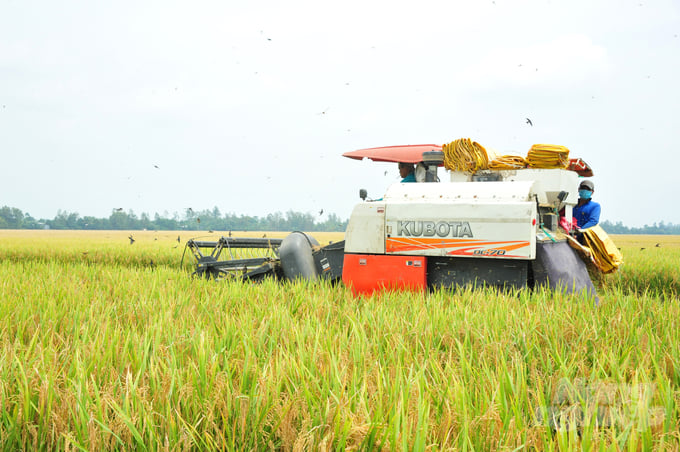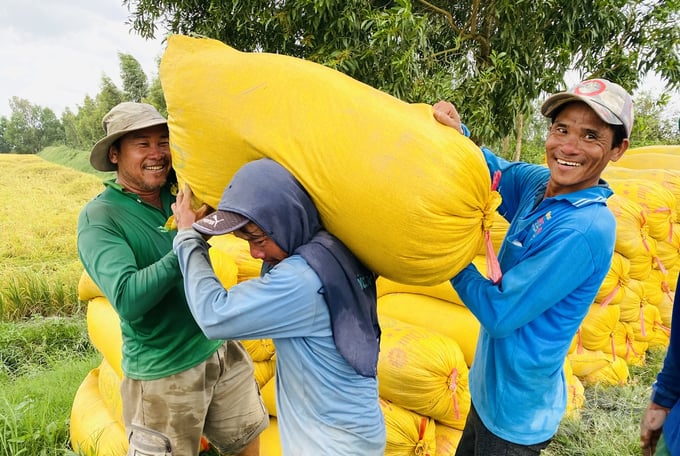May 26, 2025 | 18:43 GMT +7
May 26, 2025 | 18:43 GMT +7
Hotline: 0913.378.918
May 26, 2025 | 18:43 GMT +7
Hotline: 0913.378.918
The Vietnam Agriculture Newspaper conducted an interview with Mr. Truong Kien Tho, Deputy Director of the An Giang Department of Agriculture and Rural Development, to delve into this matter.
Mr. Tho, An Giang is one of the key provinces in rice production and export, playing a pivotal role not only within the Mekong Delta region but also nationally. An Giang has been a pioneer in creating expansive fields and, at present, how have the linkages between rice production and consumption, as well as other agricultural products, contributed to the development of the major industry and increased income for rice growers?
It can be stated that in recent times, the development of various collective economic models, cooperatives engaged in value chain-linked production of key agricultural commodities, with rice being at the forefront, has garnered the primary attention of the Provincial Party Committee and People's Committee of An Giang Province. The province has concentrated efforts on implementing tasks related to the development of cooperatives, cooperative complexes linked to sustainable and enduring production and consumption. Concurrently, there has been a gradual encouragement and stimulation of investment in the agricultural sector. Through these initiatives, a transformation in the production mindset of farmers has been fostered, aligning with practical requirements and aiming towards market-oriented production based on specific orders.

Mr. Truong Kien Tho, Deputy Director of An Giang Department of Agriculture and Rural Development. Photo: Le Hoang Vu.
As a result, the agricultural sector in An Giang has proactively collaborated with relevant entities to jointly implement and establish collaborative inter-sectoral programs. These collaborations involve the Department of Industry and Trade, the Center for Trade and Investment Promotion, the Provincial Farmers' Association, the Provincial Cooperative Alliance, and the State Bank of Vietnam's An Giang branch. These efforts are considered to be one of the focal points in the realm of cooperation, aimed at constructing sustainable production and consumption linkages for agricultural products within the locality. Additionally, these endeavors seek to foster cooperative ventures and value chain integration in agricultural production and product consumption, while harnessing the inherent local potentials and strengths.
On another note, to ensure a seamless dissemination of policies regarding linkages and consumption, the Department of Agriculture and Rural Development has led the coordination with relevant departments and district-level People's Committees to conduct training workshops and policy dissemination conferences. These events target various groups, including individual farmers, cooperatives, cooperative groups, and enterprises. The utilization of tools such as banners, handbooks, pamphlets, and guidebooks pertaining to production and consumption linkages for agricultural products further facilitates the propagation of these policies.
Furthermore, with a concentrated effort that maximizes available resources to support sustainable rice production and value chain linkages, how has An Giang Province achieved tangible outcomes through these endeavors?
Up to the present, the entire province boasts 209 agricultural cooperatives, 2 cooperative alliances, encompassing 37 agricultural cooperatives and 2 cooperative alliances where personnel from Loc Troi Group Corporation are involved in managing operations and facilitating annual production and consumption linkages for rice and glutinous rice with the Loc Troi Group Corporation. In 2022, the province witnessed 63 agricultural cooperatives, 2 cooperative alliances, and 180 cooperative groups actively engaging in production and consumption linkages for agricultural products alongside organizations and enterprises. This collaboration covered an approximate linked area of 123,089 hectares. From 2021 to 2022, the total linked area reached around 206,000 hectares, with predominant enterprises including Loc Troi Group Corporation, Angimex Company, Tan Vuong Cereal Co., Ltd., Tan Thanh An Co., Ltd., An Thanh Co., Ltd., Gia International Company Limited, Phuoc Thinh Co., Ltd., and more.

An Giang Province is actively promoting the development of cooperation and linkages in agricultural production and product consumption, thereby creating value chains and harnessing the potential of local strengths. Photo: Le Hoang Vu.
In terms of developing production according to value chains coupled with the application of advanced technology, the implementation of the "Footprint-Free Fields" model (a safe rice cultivation model linked to production and consumption by Binh Thanh Cooperative in Thoai Son District with Loc Troi Group Corporation) has been an outstanding example. The model commits to a minimum profit of 40 million VND per hectare per year and ensures guaranteed market outlets.
The implementation of rice production combined with synchronized mechanization from the beginning to the end of each crop season helps to economize seed usage, reduce fertilizer and chemical usage, minimize labor input, and cut production costs by 20-30% compared to traditional methods. This approach also addresses environmental pollution concerns and adapts to climate change, in line with the spirit of Decision No. 854/QD-TTg dated July 19, 2022, by the Prime Minister approving the Project to enhance climate change adaptation capacity for agricultural cooperatives in the Mekong Delta region, phase 2021 to 2025.
At the same time, the province has not only integrated a production and consumption linkage model based on value chains but also capitalized on discarded agricultural byproducts. The organic fertilizer production model from rice straw residues by Phu Thanh Cooperative has been developed and has displayed promising results.
Leveraging the investment support in equipment from the "Green Innovation Renewal Center" Project (organic fertilizer mixer), Phu Thanh Cooperative has expanded its services to produce organic fertilizer from rice straw residues after rice harvest. This adds value to the production chain through activities such as purchasing rice straw, entering into contracts with households engaged in straw mushroom cultivation, and implementing technical processes for composting and mixing rice straw residues (after mushroom cultivation) to create a new product – safe organic fertilizer for plants, which is then supplied to the market. This contributes to enhancing economic efficiency for cooperative members and mitigating negative environmental impacts such as emissions and pollution.

In 2022, the province had 63 agricultural cooperatives, 2 cooperative alliances, and 180 cooperative groups actively engaged in production and consumption linkages for agricultural products with various organizations and enterprises. The linked area covered approximately 123,089 hectares. Photo: Le Hoang Vu.
This is a novel endeavor applying circular agriculture, making the utmost use of resources to adapt to climate change. Currently, this initiative is in the pilot phase, evaluating its effectiveness in order to refine and replicate the model for the better into the future. Moreover, the local authorities have been effectively implementing memoranda of understanding and cooperation agreements between the Provincial People's Committee and businesses. The primary objective is to facilitate conditions for people to join cooperatives, enabling them to connect, link production and consumption with numerous enterprises and partners within and outside the province.
Step by step, cooperative relationships in production and sales are being formed, based on partner-specific orders, with clearly committed selling prices from the outset. Farmers collectively purchase and sell their products, obtain agricultural supplies at reasonable prices, benefit from post-harvest credit, and are ensured the quality of supplies and supported market outlets.
Based on the practical implementation of policies supporting value chain linkages in rice production, where cooperatives play a pivotal role, what advantages does An Giang possess in the implementation process?
In the interconnection between enterprises and farmers through representative farmer organizations, roles and production linkages among parties are maximized. Consequently, the awareness, mindset, and management skills of cooperative leadership and operation have steadily improved. Many cooperatives are beginning to shift their focus towards concentrated agricultural production and are actively establishing value chain linkages with enterprises from production to market outlets. This effort enhances product quality, cultivates brands, and adds value to products in order to meet market demands.

An Giang Province has gradually fostered cooperative production relationships and trade based on partner-specific orders, with clear committed selling prices from the outset. Farmers practice collective purchasing and selling. Photo: Le Hoang Vu.
The dissemination of policies regarding agricultural product production and consumption linkages within An Giang Province has to some extent facilitated the connection between enterprises and farmers. Moreover, it has served as a driving force to encourage more sustainable practices. Currently, there are numerous enterprises showing keen interest in product quality and consequently investing in production.
Thank you very much!
Translated by Nguyen Hai Long
/2025/05/25/4127-3-073637_820.jpg)
(VAN) Thanks to the promotion from an FAO-implemented project, vegetable production in greenhouses in Moc Chau has seen strong development, from 1.5 hectares in 2021 to nearly 50 hectares in 2024.

(VAN) FAO has recently supported USD 140,000 to implement the project 'Risk mitigation human-animal interface risks through disease control initiatives in pig farming.'

(VAN) The People's Committee of Tra Vinh province has approved an adjustment to the investment policy for the Green Hydrogen Plant project, increasing its area to approximately 52.76 hectares.
![Reducing emissions from rice fields: [2] Farmers’ commitment to the soil](https://t.ex-cdn.com/nongnghiepmoitruong.vn/608w/files/news/2025/05/05/dsc08881jpg-nongnghiep-140632.jpg)
(VAN) Clean rice cultivation model in Thuong Tan commune, Bac Tan Uyen district, is assisting local residents in achieving sustainable agriculture by substantially reducing costs, increasing productivity, and protecting the environment.

(VAN) At the conference to disseminate Resolution No. 68, AgriS introduced its digital agricultural ecosystem and reaffirmed its commitment to accompanying the Government in promoting private sector development and sustainable agriculture.

(VAN) 'Blue Ocean - Blue Foods' initiative is designed to restore marine ecosystems and establish sustainable livelihoods for local communities by cultivating a minimum of 1,000 hectares of cottonii seaweed in the first three years.
/2025/05/21/4642-3-112707_603.jpg)
(VAN) The V-SCOPE project has made direct contributions to three out of six pillars of the Comprehensive Strategic Partnership between Vietnam and Australia.